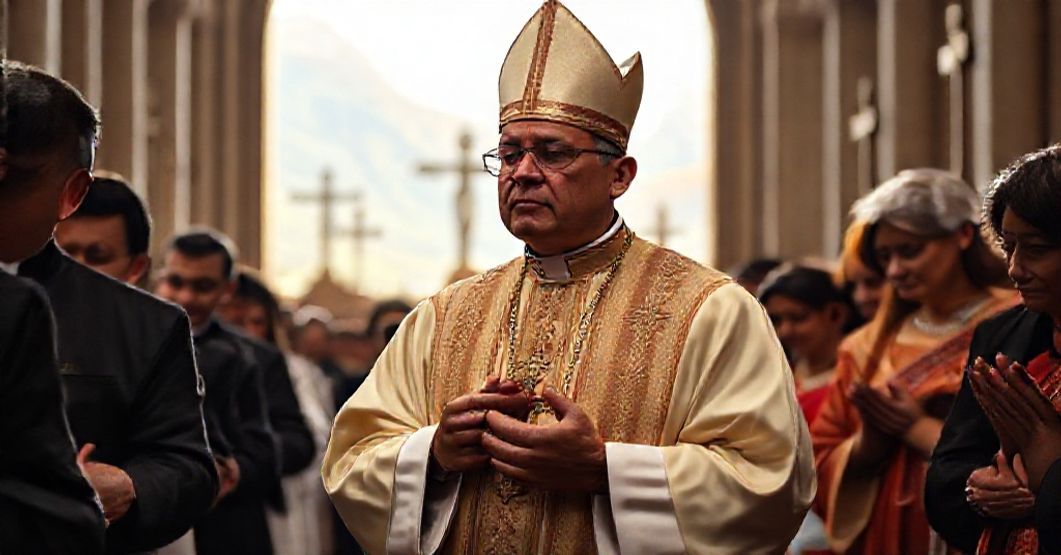Antipopes of the Antichurch



















Timeline of this heretical pontiff
Encyclical Letters
+ 15 posts1959
+ 7 posts1961
+ 4 posts1962
+ 2 posts1963
+ 2 postsApostolic Exhortations
+ 3 postsApostolic Constitutions
+ 93 posts1958
+ 6 posts1959
+ 87 postsMotu Proprio
+ 15 posts1958
+ 1 posts1959
+ 1 posts1962
+ 11 postsApostolic Letters
+ 151 posts1958
+ 4 posts1959
+ 63 posts1960
+ 78 posts1961
+ 1 posts1962
+ 4 posts1963
+ 1 postsSpeeches
+ 99 posts1958
+ 2 posts1959
+ 26 posts1960
+ 29 posts1961
+ 16 posts1962
+ 24 postsMessages
+ 6 posts1959
+ 4 postsHomilies
+ 4 postsLetters
+ 152 posts1958
+ 1 posts1959
+ 48 posts1960
+ 32 posts1961
+ 31 posts1962
+ 30 posts1963
+ 10 postsNot categorized
+ 1 posts1958
+ 1 postsNews feed


Nostra Patris (1961.06.29)
In this Latin letter of 29 June 1961, John XXIII addresses Martin John O’Connor, head of the Pontifical Council for Cinema, Radio and Television, on the 25th anniversary of Pius XI’s Vigilanti cura. He praises Pius XI’s concern for cinema, recalls the moral dangers of film (especially for youth), notes ecclesiastical initiatives to promote morally acceptable productions, commends national and international Catholic film organizations, and exhorts continued efforts so that cinema may serve education, culture, and “honest entertainment” under the guidance of competent ecclesiastical authorities. The entire text maintains a tone of pastoral encouragement toward collaboration with modern media and confidence that Catholic structures can elevate cinematic art for the moral and cultural benefit of society.
This apparently pious exhortation, however, is a paradigmatic document of the conciliar revolution: it subtly subordinates the supernatural mission of the Church to the naturalistic cult of culture, entertainment, and dialogue with the world, replacing the Kingship of Christ with managerial optimism about poisoned instruments that are objectively vehicles of apostasy.


Pater Misericordiarum (1961.08.22)
John XXIII’s Latin letter “Pater Misericordiarum” (22 August 1961) addresses Rufino Santos and the other ordinaries of the Philippine Islands, congratulating them on the state of their seminaries after an apostolic visitation. He praises adequate buildings, growing numbers of candidates, the presence of spiritual directors, the emphasis on discipline, Latin, human letters, and the establishment of pre-seminaries, post-seminaries, and the Pontifical Philippine College in Rome. He exhorts bishops to select worthy candidates, appoint exemplary formators, and foster priestly vocations through parish-based works.


Semper exspectatus (1961.10.12)
Dated 12 October 1961, this brief Latin letter of John XXIII (“Semper exspectatus”) is addressed to Antonio María Barbieri, “cardinal” and “archbishop” of Montevideo, on the 25th anniversary of his episcopal consecration. It congratulates him on his “merits,” his attachment to the Roman See, his preaching and social concern for the poor, encourages him to persevere as a “good shepherd” and Franciscan religious, grants him the faculty to impart, in the “pope’s” name, a blessing with a plenary indulgence to the faithful on a chosen day, and concludes with an Apostolic Benediction upon him, his auxiliary, and his flock. Behind this apparently harmless compliment letter stands a counterfeit authority, a manipulated notion of episcopal ministry, and a sacrilegious use of indulgences that presupposes the very conciliar revolution which would soon devastate the Church.


Ad Dilectos (1961.12.08)
The Latin text published under the name of John XXIII as “Ad Dilectos” (8 December 1961) is presented as a paternal letter to the hierarchy of Latin America: it praises the Catholic past of the continent, commends Marian devotion, calls for catechesis, sacramental life, promotion of so‑called “Catholic Action,” and urges collaboration with civil authorities on social, economic, and political questions, insisting that no stable order can exist without moral foundations supposedly articulated by “the Church.” It closes with assurances of prayer and a blessing upon peoples and rulers of Latin America, in the spirit of concord, social justice, and peace.
Varia
Announcement:
– News feed –implemented
– Antipopes separate web sites with their all documents refutation – in progress
